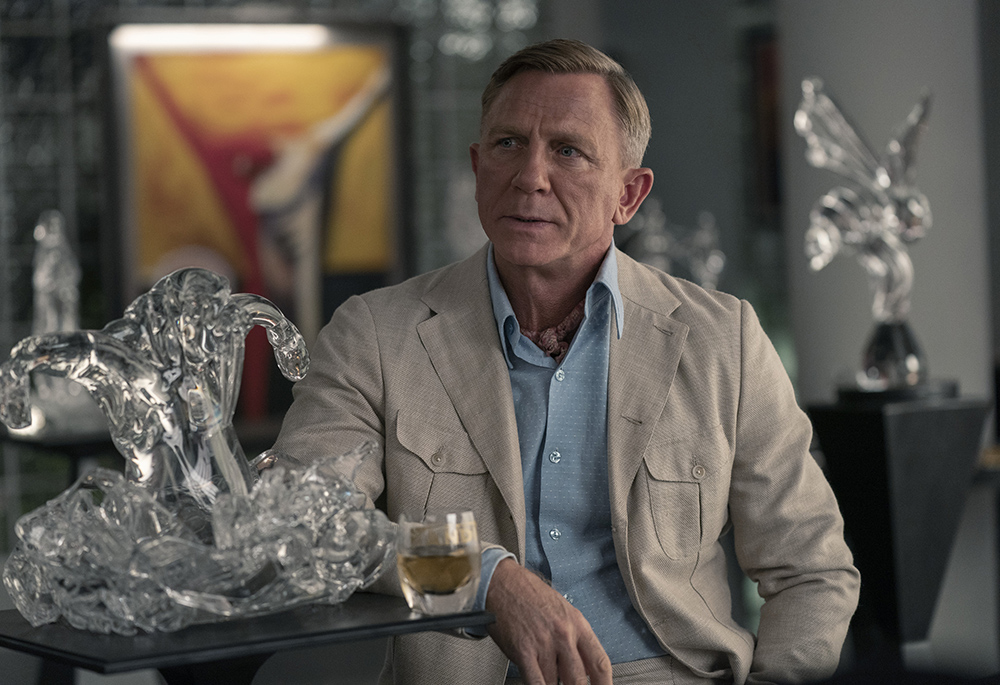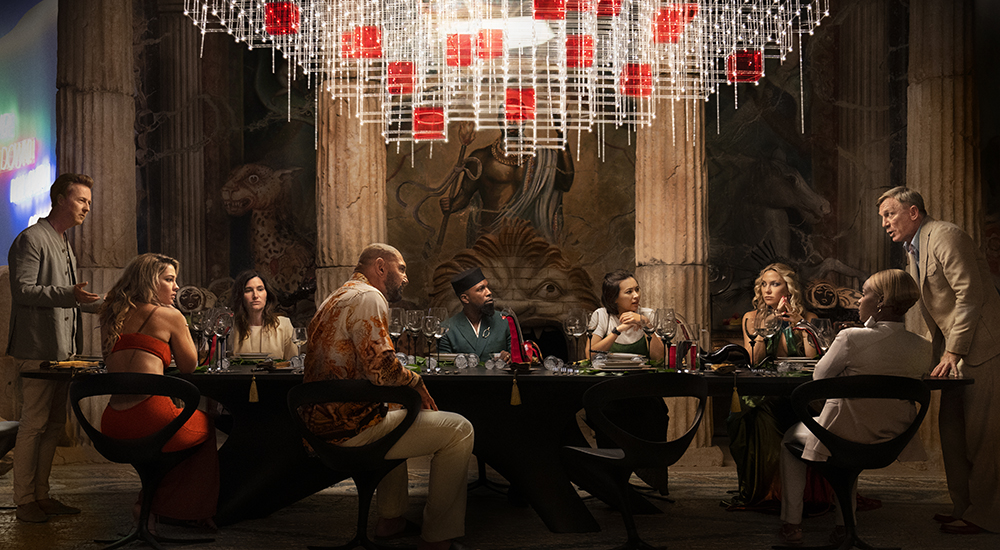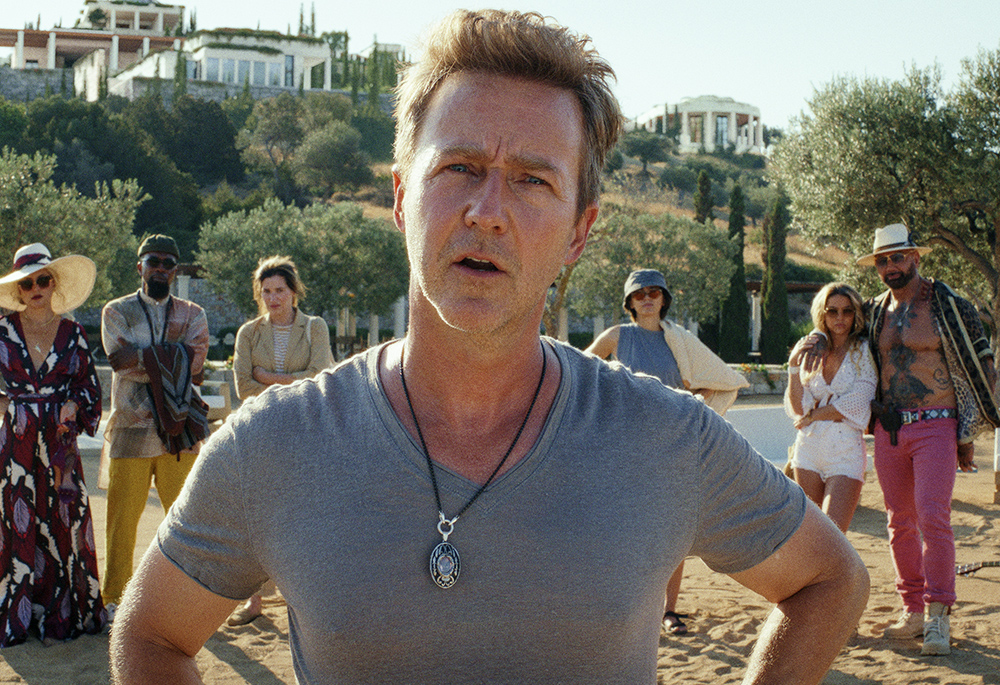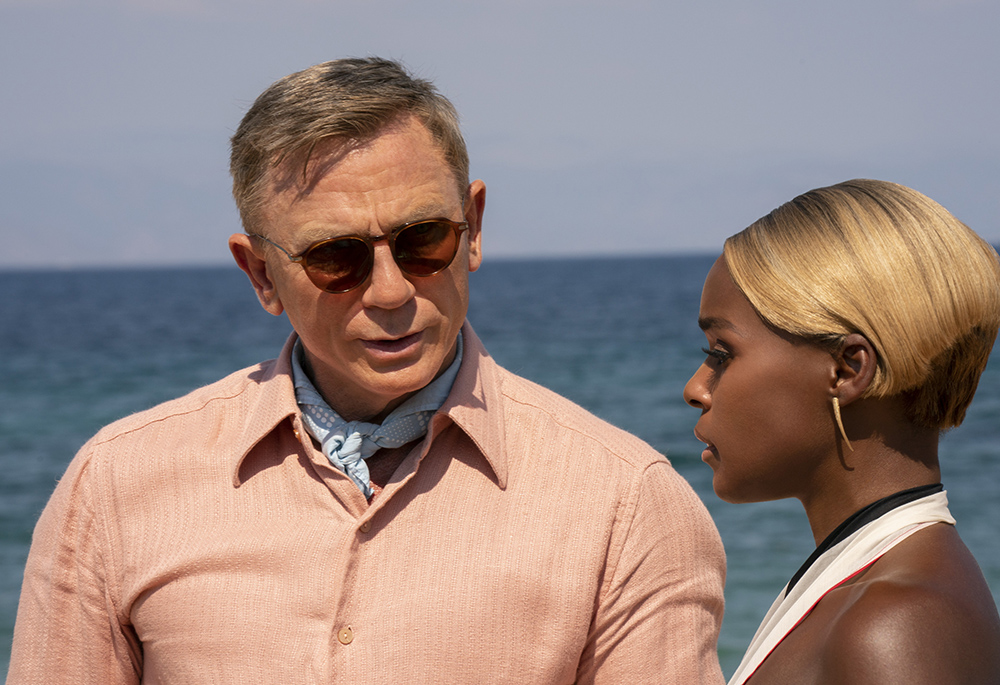
Daniel Craig as Detective Benoit Blanc in "Glass Onion: A Knives Out Mystery" (Netflix/John Wilson© 2022)
Editor's note: This review of "Glass Onion: A Knives Out Mystery" discusses the plot twist and ending. If you don't want any spoilers, read the review with caution.
If "Glass Onion: A Knives Out Mystery" was merely an excuse for some of the best film actors in the world to hang out on a Greek island and play uproarious characters in a silly whodunit movie, that would've been enough.
And while "Glass Onion" certainly grabs our attention with popcorn-flick fun and spectacle, it transcends its genre to become a masterwork of social satire. The movie's targets include megalomaniac billionaires, corrupt politicians, internet influencers, blabbermouthed celebrities, and maybe even all of us watching, too.
First, though, there is the surface-level pure delight of "Glass Onion." It starts with Daniel Craig's Benoit Blanc, private investigator, reprising his role from the first "Knives Out" movie. Every second you get to watch and hear Craig in this role is a gift. I'd watch a five-hour cinéma vérité documentary of Benoit Blanc doing chores and running errands. Every part of his character is gold: His absurd New Orleans-ish accent, his meme-worthy facial expressions of amusement and disgust, his anachronistic syntax and vocabulary that feel like they come from a century-old parallel universe. Blanc sets the floor for this "Knives Out" movie or any potential sequels pretty high.
As in the original "Knives Out," Craig's performance is set against a star-studded ensemble cast playing rich people behaving badly. The richest and worst of them this time around is Miles Bron (Edward Norton), tech billionaire and a stand-in for men like Elon Musk, Mark Zuckerberg and Donald Trump. He talks in pseudo-intellectual business aphorisms about "true disruption" and "infraction points." The film's social commentary revolves around him.

Edward Norton, Madelyn Cline, Kathryn Hahn, Dave Bautista, Leslie Odom Jr., Jessica Henwick, Kate Hudson, Janelle Monae, and Daniel Craig in "Glass Onion: A Knives Out Mystery" (Netflix/John Wilson© 2022)
Bored in COVID-19 lockdown, Bron has summoned his closest friends to his private island for a weekend getaway and complicated murder mystery game. The guests, who are more lackeys dependent on Bron's money and influence than true friends, include the governor of Connecticut, a "men's rights" Twitch streamer, the head scientist of Bron's company, and a politically incorrect fashion designer.
The arrival of one additional person on the island surprises everybody: Andi Brand (Janelle Monáe), Bron's ex-business partner he kicked to the curb in a litigious breakup. We learn Brand had raised safety and ethics concerns about one of Bron's new products, a hydrogen-based power source called Klear that Bron is determined to bring to market immediately. (It's even powering his island compound.)
Advertisement
Bron, we later learn, was especially shocked to see Brand because (spoiler alert) he thought he had killed her days before to cover up compromising information about his company. In the movie's shocking central twist, it's revealed that Andi is indeed dead. It's her identical twin Helen Brand (also played by Monáe) who has arrived on the island, having hired Blanc to investigate Andi's murder.
It almost seems too obvious that the domineering business titan would be the villain, but that's a central point of the movie: People who are willing to trample on others in their pursuit of power and wealth, people who think their financial success makes them better than everyone else, people who think they can do no wrong because they're surrounded by sycophantic yes-men who want their own payday … well, the move to violence in pursuit of self-preservation isn't that big of a leap, is it?

Kate Hudson as Birdie, Leslie Odom Jr. as Lionel, Kathryn Hahn as Claire, Edward Norton as Myles, Jessica Henwick as Peg, Madelyn Cline as Whiskey and Dave Bautista as Duke in "Glass Onion: A Knives Out Mystery" (Courtesy of Netflix © 2022)
After Bron's guilt is revealed, there is momentary hope the justice system will be able to hold him to account for his numerous crimes. But Bron destroys the only hard evidence there is, and he knows his friends are too indebted to him to testify against him in court. As Bron outlines how he's going to avoid any punishment, viewers might think of all the superrich people who have avoided harsh consequences despite obvious malfeasance: Trump; New York Mets team owner Steve Cohen, suspected of insider trading; Wall Street CEOs from the subprime mortgage era, and so on.
As it becomes clear the system is powerless against Bron, the bookish Helen makes a sudden transformation into a vigilante. She destroys Bron's glass statues, and then uses a small piece of the "Klear" material to set the whole compound on fire. The "Mona Lisa," which Bron had rented from the Louvre during the museum's COVID-19 closure, burns. This escalation in the movie happens so quickly and thoroughly it's disorienting to process at first — it feels out of Helen's character and shifts the entire tenor of the movie.
But as writer/director Rian Johnson told the Atlantic's David Sims, the movie is "a bit of a primal scream against the carnival-like idiocy of the past six years." Helen's response here at the film's climax is the embodiment of this scream.

Daniel Craig as Detective Benoit Blanc and Janelle Monáe as Andi in "Glass Onion: A Knives Out Mystery" (Netflix/John Wilson© 2022)
It's easy to see "Glass Onion" as good vs. evil, with us viewers aligning with Blanc and Brand against Bron and his lackeys. But I don't think you and I are totally spared from the film's satirical aims. In that same interview with Sims, Johnson describes his fascination with our relationship with these types of insanely successful entrepreneurs, "where we want to hate them but we also want to kind of believe they're Willy Wonka." Like Bron's friends, we kind of admire the superrich and don't actually want to burn the whole thing to the ground.
Because while I object to Elon Musk, I still spend hours a day on Twitter. I object to Jeff Bezos but buy hundreds of dollars of stuff on Amazon a month. I object to Mark Zuckerberg but post on Facebook and Instagram all the time. My condemnations lack teeth because I rely so heavily on these enormous corporations. Would I have smashed Bron's island castle apart or shrugged my shoulders at the injustice committed? I'm not so sure.
"Glass Onion" pulls off the paradoxical achievements of providing nonstop entertainment while making us examine our complicity in the evils that bring us our entertainment. We are amused and discomfited by our amusement. That's impressive depth from a traditional whodunit. I can't wait to see what case Benoit Blanc chooses next.







